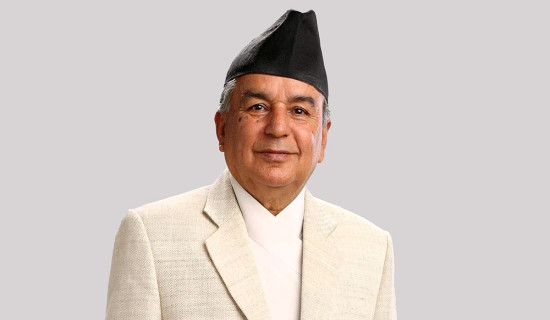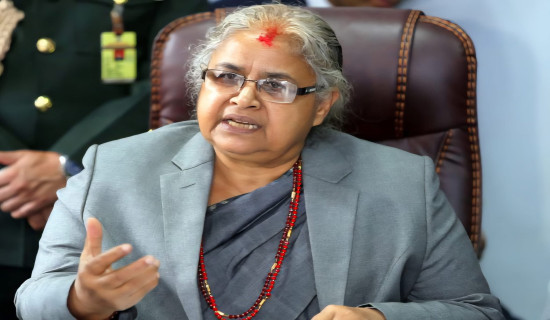- Wednesday, 4 February 2026
A Leader Off The Beaten Track
Pain translates into drastic deals over pent up feelings and rampant public frustrations. Absence of rule of law aggravated the situation. Seven military coups have occurred in as many African states since 2020, highlighting the intensity of public anger against corrupt and incompetent leaders. And people in the coup-affected countries seem to have greeted the military rulers with enthusiasm, apparently in the belief that the strongmen would restore a modicum of rule of law and check corruption. They seem to signal that anything will do as long as corruption control becomes a serious priority and checked in all seriousness.
In Central America, El Salvadorians have been infected by similar encounters. They have given a massive mandate to President Nayib Bukele in multiple manifestations of their confidence on the no-nonsense tactics he has employed. They reelected him for a second term in office in March with a breathtaking 84.65 per cent of the votes cast, and also gave his party a landslide majority in the legislative assembly. The ruling Nuevas Ideas (NI) has 54 seats in a house of 60 members, with four opposition parties sharing the remaining six seats.
The popular verdict on Bukele is that he is a man of action and does not indulge abuse of power. He managed to amend the constitution in December 2022 to allow him a second consecutive term in office replacing the earlier provision that stipulated that there be at least a ten-year gap between a president’s two terms. Shortly after, Bukele introduced changes that reduced the number of national legislators from 84 to 60 while the number of municipalities were lowered from 262 to 44.
Clear message
NI’s triumph was no fluke but a strong stamp of popular support that placed it in comfortable positions to govern in 28 municipalities whereas its allies triumphed in 15 other municipalities, with the opposition reduced to winning in a lone municipality. Described as a turning point in the Central American state’s political system, the Bukele phenomenon sends a strong signal to the entire region and beyond that traditional parties should learn not to take voters for granted.
Inaugurated president in June 2019, Bukele won the presidential election under the banner of the Grand Alliance for National Unity, and not from either of the country's two largest political parties, the Nationalist Republican Alliance and the Farabundo Marti National Liberation Front. Gangs extorting money from law-abiding citizens and resorting to frequent violence prompted the new government to launch a crackdown. Large scale arrests were made, and about 150 deaths in custody were reported within a year. Bukele is seen as a savior — the man who brought things to order. Criminals and goons were bundled into a huge prison. He obtained special powers in 2022 under a “state of emergency”.
In the first 20 months of the special powers he exercised, at least 76,000 persons were arrested. This turns out to be more than one per cent of the country’s total population of 6.83 million. As many as 25,000 known gang members had been terrorising the public for too long and with impunity. The measures had telling effects. Crime rates dropped steeply, and the president’s public approval ratings climbed remarkably. Critics and sections of the media called him an “authoritarian” and “autocratic” ruler, but he decided that his methods constituted a doctrine of necessity, endorsed by the popular mandate of indisputable clarity.
Bukele presented himself as someone who loves his country and upholds the belief that people’s interests overtake all other considerations. El Salvadorians knew who they were voting just as the American people knew who they were electing to the US presidency last month. Donald Trump was the Republican Party candidate, who had served as president for four years but lost in his re-election bid in 2020 but not without sparking off long-standing controversies over alleged ballot-tampering.
The media reviled Trump for eight years since the time he campaigned in 2016. By November 2024, voters knew the candidate’s background inside out, thanks to media criticisms against his records. Weighing the pros and cons, they did not hesitate to crown him the winner to the White House. Voters’ verdict is after all the ultimate decider in a democracy, though differences of opinion invariably echo almost everywhere.
Last resort
The El Salvadorian case has had distinct demonstration effects, particularly where conditions are bad on various fronts. Some sections in different countries are already thinking aloud that the Bukele approach might be an interim prescription for coping with deteriorating situations or when law and order is on the verge of collapse. Disenchanted people toy with the idea of applying drastic measures. This is a risk-ridden idea. It is the responsibility of political parties and their leadership to go for appropriate initiatives for addressing public grievances.
During his term as president of the Philippines, Rodrigo Duterte launched a severe crackdown on drug dealers, which sent shivers down the spine of many a drug cartel. Human rights watch groups condemned the methods employed. More than 10,000 persons were killed in drug raids. In an angry reaction to criticisms from the US, Duterte called President Barack Obama “a bastard”, and challenged the American intelligence agency, CIA, to assassinate him for what he was doing for his countryfolks.
Emergency powers cannot be a permanent remedy but some people seem satisfied to employ the bitter pill in pursuant of setting gross order aright. The method is considered as the last resort for a desperate government with desperate people facing desperate situations. In El Salvador’s elections this year, there were no charges of electoral discrepancies, and the verdict was a foregone conclusion, given the open and wide support expressed for him all over the country. Only the margin with which the incumbent would win was of general interest.
Political history is fraught with popular leaders failing miserably in power. This has repeated too often for people not to be without great caution. Overly enthusiastic expectations can end with a whimper. Hoping for the best while also being on constant guard are among the requisites for echoing popular wants and conscientious opinions based on knowledge and valued experience.
(Professor Kharel specialises in political communication.)

















